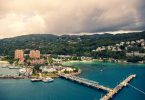COLLEGE PARK, Md., June 26, 2018 /PRNewswire-USNewswire/ — Cuba’s recent announcement to triple its cruise ship berths at the port on the edge of Old Havana by 2024 may seem surprising coming just months after President Donald Trump moved to clamp down on Americans’ travel to Cuba. But it shouldn’t, says Kislaya Prasad, research professor and academic director of the Center for Global Business at the University of Maryland’s Robert H. Smith School of Business.
The port expansion actually reflects the flavor of the restrictions U.S. travelers face since the crackdown. U.S. travelers are banned from visiting Cuba’s government-backed hotels and restaurants – and that makes cruise liners, with their built-in lodging, restaurants and educated tour guides, the perfect way to explore the long-off-limits island nation.
“The cruise ships have customized excursions that meet the criteria for ‘educational’ U.S. travel to Cuba,” Prasad says.
The cruise companies, by nature, are taking travelers in groups, but now also are organizing educational agendas for those visits and are assisting customers with the government’s required paperwork.
“Somebody who is going on a cruise can just have the company organize the paperwork, and they can just go to Havana and feel secure about not flouting any laws about which hotels they are allowed to stay in or what restaurants they are allowed to eat in,” Prasad says. “Those kinds of risks are mitigated.”
He and Rebecca L. Bellinger, executive director of the Smith School’s Center for Global Business, recently co-edited and helped to co-write a forthcoming book, “Cuba In Transition: Lessons from a Faculty Development in International Business Program.” The book includes their own reflections from years of traveling to the country as well as contributions from a dozen other scholars, including the Smith School’s Anandasivam Gopal.
The number of cruise ships making port calls in Havana, Cienfuegos and Santiago de Cuba has surged in the past two years, now topping more than 650 sailings, much of them boarded by Americans. That’s poised to increase yet again, with Cuba recently signing a deal with the world’s largest independent cruise port operator to increase capacity at the terminal in Havana.
Cuba has become a popular destination for cruise travelers. More than 700,000 passengers are expected this year, up from 397,500 last year, and just 37,500 in 2015. And under the deal with Turkey-based Global Ports Holding, the port will triple its cruise ship berths to six by 2024.
“They were starting at such a low base,” Prasad says of Cuba’s port capacity. “Cuba has a long, long way to go to get anywhere close to the U.S. Virgin Islands or the Bahamas.”
Even without U.S. travelers in Cuba, there would still be potential for expansion, given the number of visitors each year who travel from Canada and Western Europe.
Nonetheless, small entrepreneurs in Cuba – owners and employees of the paladares and casa particulares – across the budding Cuban hospitality sector are feeling pinched by the revised U.S. policies. And the loss of high-spending U.S. customers may be a result of many of the U.S. visitors coming off cruise ships and making a short visit restricted to Old Havana, Prasad says.
GOT NEWS? click here
Google News, Bing News, Yahoo News, 200+ publications
“Sadly, this trend is the opposite of what was hoped for when travel restrictions to Cuba were first lifted during the Obama administration,” he says. “The hope was that a rising middle class would be emboldened to demand greater freedoms, and this eventually lead to a more open society.”
Even when Trump rolled back some of the policies of the previous administration, Prasad says, the intention was to target establishments owned by the Cuban Army – not the private sector. The new policies, Prasad says, by many accounts are hitting the private sector hardest, while leaving the state sector largely insulated.
Visit Smith Brain Trust for related content at http://www.rhsmith.umd.edu/faculty-research/smithbraintrust and follow on Twitter @SmithBrainTrust.
About the University of Maryland’s Robert H. Smith School of Business
The Robert H. Smith School of Business is an internationally recognized leader in management education and research. One of 12 colleges and schools at the University of Maryland, College Park, the Smith School offers undergraduate, full-time and part-time MBA, executive MBA, online MBA, specialty masters, PhD and executive education programs, as well as outreach services to the corporate community. The school offers its degree, custom and certification programs in learning locations in North America and Asia.
Contact: Greg Muraski at [email protected] or 301-405-5283
![]() View original content:http://www.prnewswire.com/news-releases/umd-expert-explains-cuba-tripling-its-main-cruise-terminal-300672453.html
View original content:http://www.prnewswire.com/news-releases/umd-expert-explains-cuba-tripling-its-main-cruise-terminal-300672453.html
SOURCE University of Maryland’s Robert H. Smith School of Business






